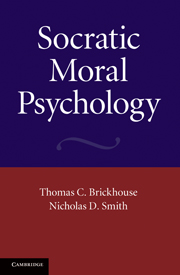Book contents
- Frontmatter
- Contents
- Acknowledgments
- Introduction
- 1 Apology of Socratic studies
- 2 Motivational intellectualism
- 3 The “prudential paradox”
- 4 Wrongdoing and damage to the soul
- 5 Educating the appetites and passions
- 6 Virtue intellectualism
- 7 Socrates and his ancient intellectual heirs: Plato, Aristotle, and the Stoics
- Appendix: is Plato's Gorgias consistent with the other early or Socratic dialogues?
- Bibliography
- Index of passages
- General index
Appendix: is Plato's Gorgias consistent with the other early or Socratic dialogues?
Published online by Cambridge University Press: 04 August 2010
- Frontmatter
- Contents
- Acknowledgments
- Introduction
- 1 Apology of Socratic studies
- 2 Motivational intellectualism
- 3 The “prudential paradox”
- 4 Wrongdoing and damage to the soul
- 5 Educating the appetites and passions
- 6 Virtue intellectualism
- 7 Socrates and his ancient intellectual heirs: Plato, Aristotle, and the Stoics
- Appendix: is Plato's Gorgias consistent with the other early or Socratic dialogues?
- Bibliography
- Index of passages
- General index
Summary
THE MYTH OF THE AFTERLIFE
Disputes about the place of the Gorgias within Socratic and Platonic philosophy
One of the dialogues we identified as included within the “relevant dialogues” group is the Gorgias. But, as we indicated in the Preface, one very important passage in the Gorgias has been recently challenged as “un-Socratic” on other grounds, and if this challenge cannot be dissolved, then we may not use this passage as evidence for our interpretation of Socratic moral psychology. Contrary to the claims of most other scholars recently, however, we believe the passage is, in fact, entirely consistent with what Socrates says elsewhere on the topic of moral psychology, and we hope our many references to this passage elsewhere in this book make a sufficient case for this claim. But in order to complete our case for using the Gorgias as extensively as we do, we must also defend the passage – in which Socrates tells Callicles a myth of the afterlife – as entirely compatible with Socratic philosophy in other ways.
In the Gorgias, Polus and then Callicles recommend rhetoric to Socrates on the ground that, without skill in persuasive speech, Socrates will be at the mercy of anyone who might wish to drag him into court and have him put to death. At the end of the dialogue, however, Socrates turns the tables on Callicles by telling him a “very fine account” (mala kala logos, 523a1) of why the worst thing that can happen to one is to arrive in Hades with a soul filled with wrongdoings (522e3–4), which will leave him dizzy and speechless when he is put on trial before the judges in the afterlife (526e4–527a4).
- Type
- Chapter
- Information
- Socratic Moral Psychology , pp. 248 - 258Publisher: Cambridge University PressPrint publication year: 2010



